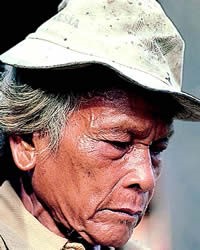Bakumpai in Indonesia

Photo Source:
Copyrighted © 2026
Anonymous All rights reserved. Used with permission |
Send Joshua Project a map of this people group.
|
| People Name: | Bakumpai |
| Country: | Indonesia |
| 10/40 Window: | Yes |
| Population: | 172,000 |
| World Population: | 172,000 |
| Primary Language: | Bakumpai |
| Primary Religion: | Islam |
| Christian Adherents: | 2.00 % |
| Evangelicals: | 0.03 % |
| Scripture: | Portions |
| Ministry Resources: | Yes |
| Jesus Film: | Yes |
| Audio Recordings: | Yes |
| People Cluster: | Banjar of Kalimantan |
| Affinity Bloc: | Malay Peoples |
| Progress Level: |
|
Introduction / History
The Bakumpai are a group of Dayak people who speak the Bakumpai language. The Bakumpai and the Dayak ethnic groups around them share many characteristics. Despite this, the Bakumpai choose to identify themselves as different from the Dayak groups mainly because of their Islamic religion (the Dayak majority are Christian).
The majority of the Bakumpai live near the Barito River, which flows through the province of Central Kalimantan. In Southern Kalimantan, the Bakumpai live in Barito Kuala regency while those in Central Kalimantan live in South Barito regency. Their neighbors in the south are the Banjar people and, in the north, the Ngaju and Maanyan peoples.
What Are Their Lives Like?
The area where the Bakumpai live is crisscrossed with many rivers. Due to this, the Bakumpai have developed technology for water transportation. They usually farm wet fields which depend on the rise and fall of the river. Their other work includes cultivation of unirrigated fields, fishing in the rivers, trade and production of household tools.
Recognition of kinship among the Bakumpai follows the Banjar bilateral system. The husband and wife together carry out their important roles within the family. According to the traditions of the Bakumpai, a newly married couple may choose their place to live. They may choose to live with the husband's relatives, with the wife's relatives, or separately in their own home. The system of dividing inheritance follows the rules of Islam.
What Are Their Beliefs?
Generally, the Bakumpai are followers of Islam. The influence of Islam can be seen in almost every aspect of their lives: in their social system, their extended family relationships and even in their artistic endeavors. Marabahan, the center of the area where the Bakumpai live, has already produced many famous Islamic teachers who have spread Islamic teaching as far as the source of the Barito River.
The Bakumpai population is steadily increasing, not only because of offspring, but also through the entrance of Dayak Christians who join the Bakumpai by converting to Islam. In fact, if a Dayak changes from Christianity or Kaharingan (traditional religion) to Islam, he or she will consider himself Bakumpai and use the Bakumpai language even when speaking to his own Dayak people group or even his family.
What Are Their Needs?
Currently the Bakumpai need technological improvement in agricultural methods to facilitate development of their swampy land. Their irrigation system is not dependable, being dependent on the rise and fall of the tides, either from the sea or from the branches of the Barito River. The Bakumpai need more medical attention, clinics and medical personnel.
Prayer Points
Ask God to send gospel workers to the Bakumpai who can help them develop more effective irrigation and agricultural methods.
Pray also for workers to build and staff medical clinics and improve the Bakumpai's health care.
Pray for the completion of a translation of scripture into the Bakumpai language and for opportunities to show the JESUS film, already available in the language.
Ask God to raise up a disciple-making movement among the Bakumpai that will draw entire households to himself and transform them into multiplying house churches.